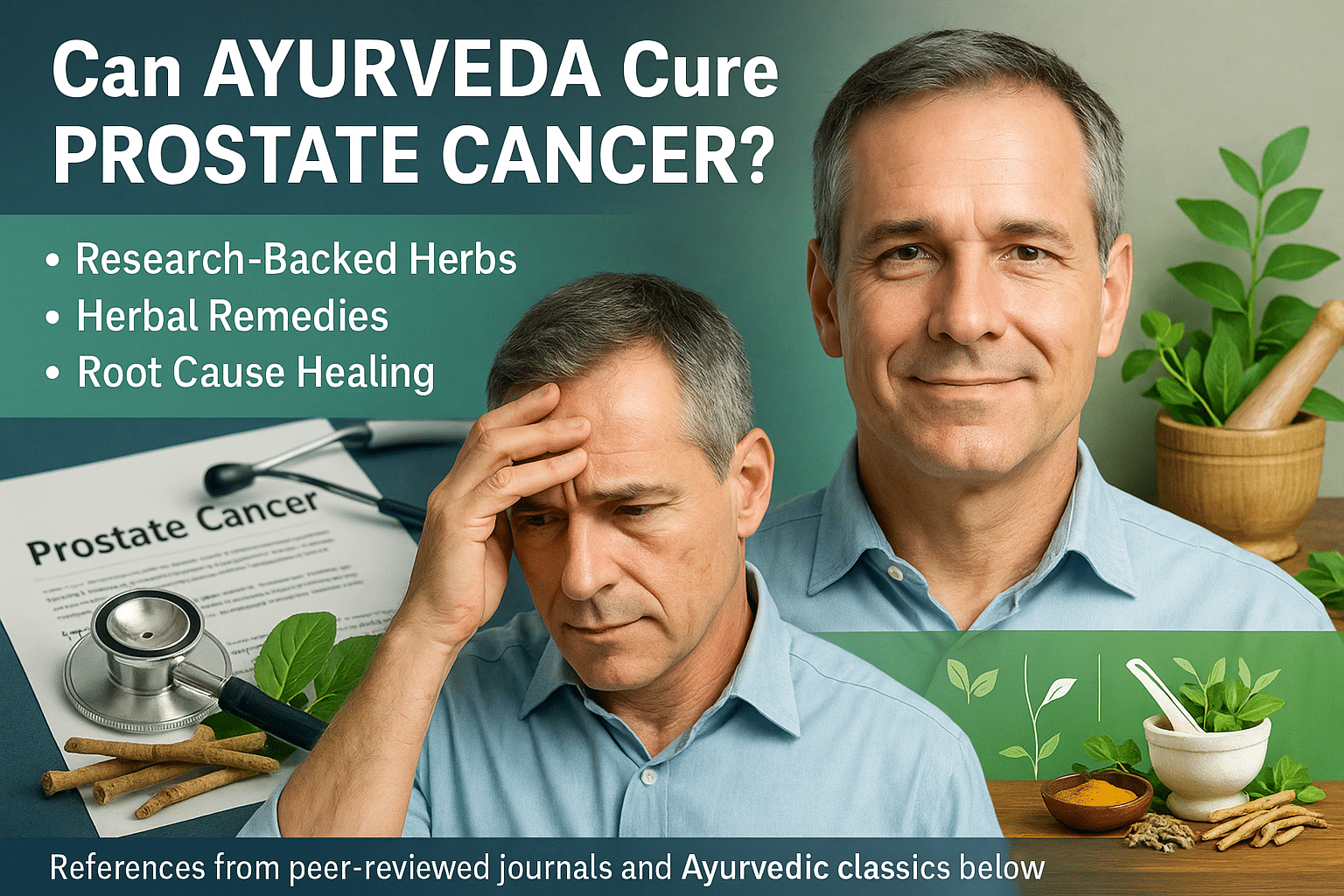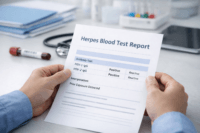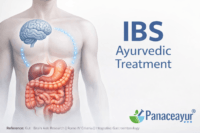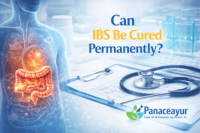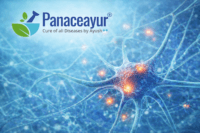- Ayurvedic Cure for Prostate Cancer Explained
- Why Most Approaches Focus on Control, Not Cure
- Unpacking the Science of Relapse: Why Prostate Cancer Returns
- The Role of the Immune System in Healing
- Ayurveda’s Vision: Healing from the Root
- The Stepwise Healing Protocol in Ayurveda
- Major Herbs Used in Prostate Cancer Protocols
- Key Ayurvedic Mineral Preparations (Bhasmas) for Prostate Cancer
- Example Integrated Protocol
- What Research Says
- Real Case Scenarios: Integrative Success Stories
- Myths and Misconceptions about Natural Cancer Cures
- How to Personalize Your Path: Dosha, Genes, and Biomarkers
- Safety, Regulation, and Practitioner Credibility
- Frequently Asked Questions on Ayurvedic Treatment for Prostate Cancer
- Complete Reference
- Modern Scientific References (APA Format with Links)
Ayurvedic cure for prostate cancer offers a holistic, root-cause-based alternative to conventional treatments. Instead of focusing solely on tumor suppression or symptomatic relief, Ayurveda addresses the underlying imbalance in Doshas, Dhatus, and Srotas. Backed by classical texts and supported by emerging research, this approach integrates herbal Rasayanas, purified minerals, and lifestyle interventions aimed at reversing the disease process from within.
Prostate cancer remains one of the most common cancers in men worldwide, presenting unique challenges in both diagnosis and treatment【1】. Many individuals find that while modern therapies such as surgery, radiation, and hormone therapy can manage the disease, the possibility of an actual cure often feels elusive【2】【3】. This gap in care has prompted patients and researchers to explore integrative and alternative solutions, with Ayurveda standing out for its unique, holistic, and evidence-backed approach to cancer care【4】【5】.
In conventional oncology, the focus is frequently on reducing tumor burden, controlling symptoms, or prolonging survival, rather than completely eradicating the disease【2】. This “management” mindset often leaves patients facing persistent side effects, fear of relapse, and reduced quality of life even after aggressive intervention【3】. As a result, many are seeking complementary strategies that can offer a genuine pathway to healing—addressing not just the cancer itself, but the whole person.
Ayurveda, the classical system of medicine rooted in centuries-old texts, has gained global attention for its individualized protocols and natural herbal-mineral formulations targeting both the root cause and the systemic imbalance believed to underlie cancer progression【4】【6】. Recent scientific research is beginning to validate several Ayurvedic remedies, with studies showing anti-cancer properties in herbs such as Kanchanar, Varuna, Ashwagandha, and Turmeric, as well as mineral preparations like Swarna Bhasma and Heerak Bhasma【7】【8】【9】.
The critical question remains: Can Ayurveda cure prostate cancer, or does it merely provide symptomatic relief? As modern science and traditional wisdom begin to converge, new insights are emerging into how holistic strategies may improve outcomes for those living with prostate cancer【5】【10】. This article explores current research, classical Ayurvedic principles, and practical herbal remedies—empowering patients to make informed choices on their journey toward recovery.
Ayurvedic Cure for Prostate Cancer Explained
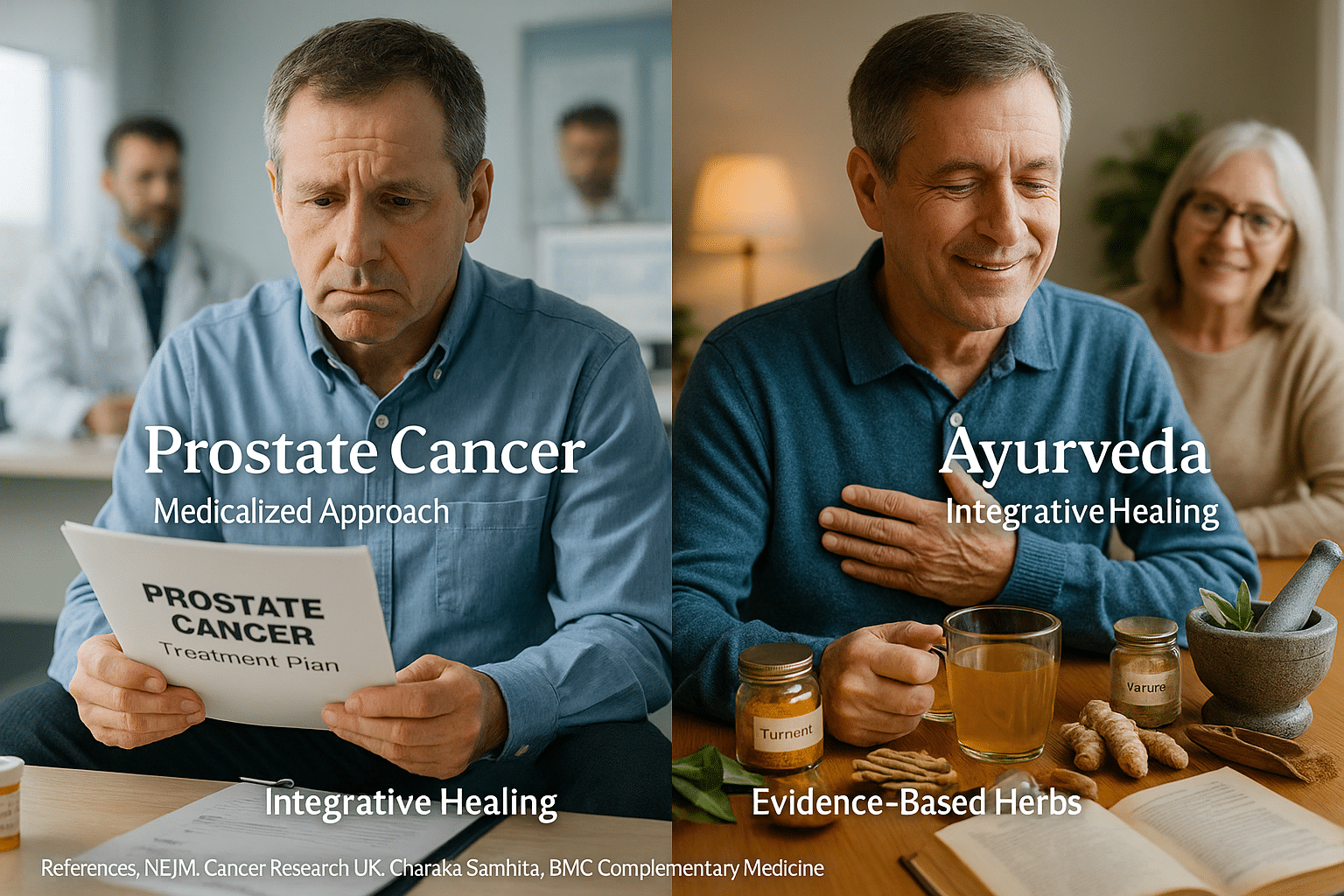
Prostate cancer is now recognized as one of the leading cancer diagnoses among men, particularly in those over the age of fifty【1】. The standard medical approach involves a combination of early screening, PSA blood tests, digital rectal exams, biopsies, and imaging technologies to detect disease at an earlier, potentially more treatable stage【2】【3】. However, despite these advances, many patients face a reality that is far more complex than early intervention and routine monitoring.
The Shadow Side: Recurrence, Side Effects, and Quality of Life Concerns
For those diagnosed with prostate cancer, the first line of treatment usually involves surgery (prostatectomy), radiation therapy, or hormone suppression therapy, sometimes in combination【4】. While these interventions can successfully reduce or even eliminate detectable cancer cells, they are not without significant drawbacks. Many men experience persistent urinary incontinence, erectile dysfunction, fatigue, and mood changes after treatment【5】. These complications can have a profound impact on daily living, relationships, and mental health.
Equally concerning is the risk of recurrence. Even after aggressive interventions, prostate cancer can return, sometimes years after initial remission【6】. For many, this cycle of treatment and surveillance becomes an ongoing challenge. The looming question is, “Will I ever be free from this disease?”
The Mainstream Paradigm: Surgery, Radiation, Hormone Blockers—What’s Missing?
Mainstream medicine continues to make remarkable progress in developing more targeted therapies and less invasive procedures. Yet, the focus remains on managing cancer as a chronic condition, rather than achieving true eradication in every case【7】. Most patients are placed on a path of lifelong monitoring, periodic scans, and sometimes repeated treatments if cancer returns. Additionally, many individuals receive hormone-blocking drugs, which, while effective at slowing cancer progression, can cause significant side effects such as osteoporosis, cardiovascular risk, and metabolic syndrome【8】.
What’s often missing in this approach is a comprehensive strategy that addresses not only the cancer itself, but also the underlying factors that contribute to its development, recurrence, and overall impact on health and well-being. Issues such as chronic inflammation, immune suppression, metabolic imbalance, and psychological stress are frequently overlooked in conventional oncology【9】.
Why Patients Seek More Than Symptom Control
Faced with these challenges, an increasing number of patients begin to look beyond conventional protocols, searching for a more complete, root-cause approach to healing. Many express a desire for therapies that not only target the cancer but also enhance vitality, restore function, and improve overall quality of life【10】. This growing interest has fueled the exploration of integrative and traditional medical systems, particularly Ayurveda, as a way to fill the gaps left by standard care.
Why Most Approaches Focus on Control, Not Cure
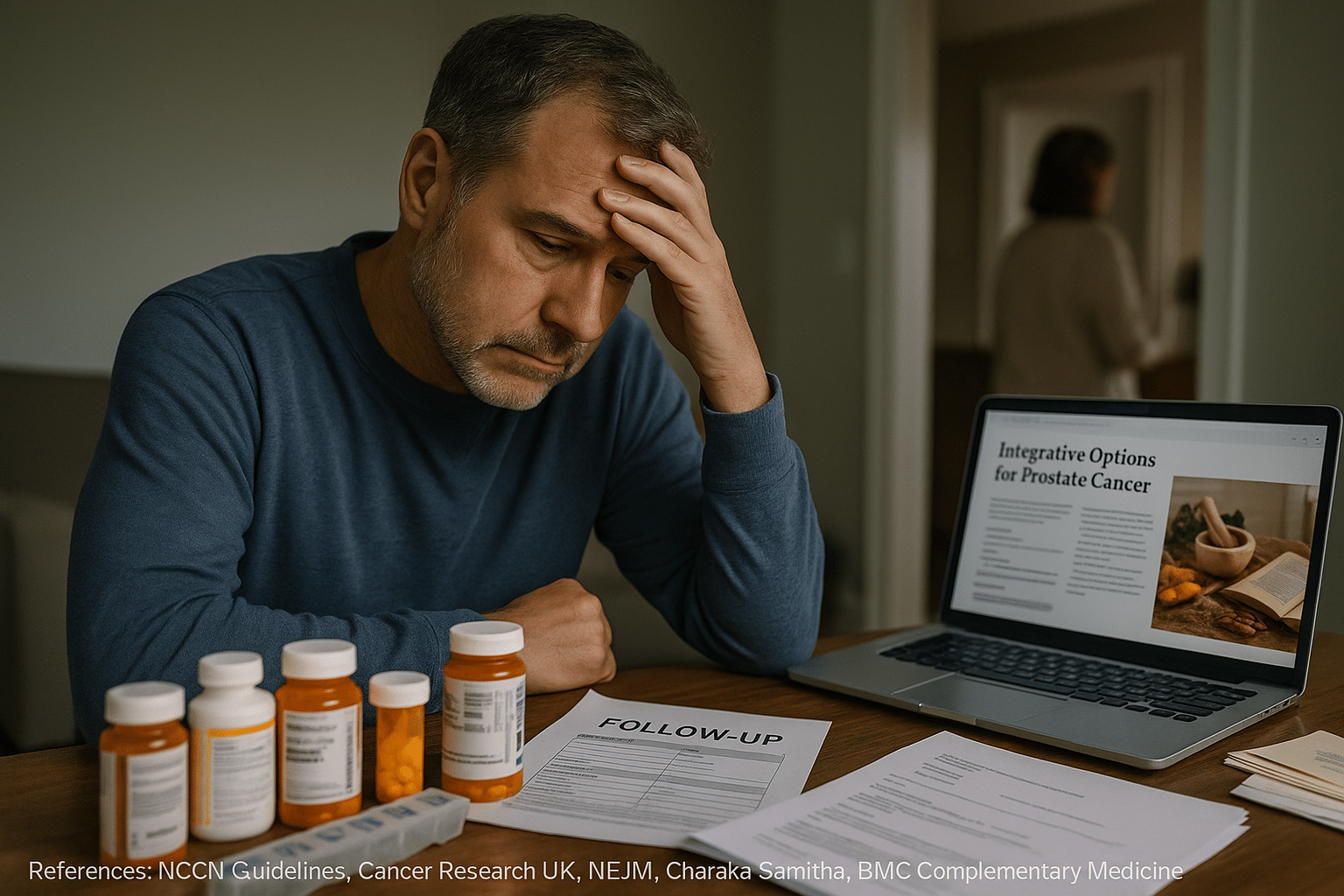
Despite decades of innovation in prostate cancer care, the modern medical system remains largely focused on controlling disease progression rather than eliminating cancer at its root【1】【2】. While surgery, radiation, and androgen-deprivation therapy can significantly reduce tumor burden and extend life, these treatments are rarely described as “curative” in medical literature or clinical conversations【3】. Instead, patients are often placed on a path of chronic management—undergoing regular checkups, lab monitoring, and sometimes repeated rounds of treatment if cancer recurs【4】.
The Chronic Management Cycle: How Patients Get Stuck
Once diagnosed, many individuals quickly discover that conventional therapy rarely means the end of their health journey. Even after successful intervention, periodic PSA (prostate-specific antigen) testing, imaging scans, and physical exams become part of routine life【5】. Any sign of rising PSA or new symptoms can trigger further tests or even additional treatments. This ongoing cycle can create a persistent sense of uncertainty and anxiety, undermining confidence in one’s long-term health【6】.
Moreover, chronic management often brings a host of long-term side effects. Hormone-blocking drugs, for example, may help slow tumor growth, but can induce bone loss, muscle weakness, mood changes, hot flashes, and increased risk of cardiovascular disease【7】. Many men experience a decline in overall vitality and mental well-being, fueling a sense of frustration and helplessness.
The Pharmaceutical Model: Dependence, Side Effects, and Diminishing Returns
The pharmaceutical industry has invested heavily in developing new agents for prostate cancer—novel hormone therapies, targeted drugs, and immunotherapies. However, most of these agents are designed to suppress cancer activity or slow its progression, not to provide a permanent cure【8】. These therapies often require ongoing use and can be associated with high costs and an ever-growing list of potential adverse effects【9】. Some patients find themselves moving from one medication to the next, as resistance develops and effectiveness declines.
The business model of lifelong treatment creates a cycle of dependence, where both patients and healthcare providers focus on “management” rather than exploring curative possibilities or root-cause resolution【10】.
True Patient Stories: Frustration and Search for a Real Solution
Increasingly, men are sharing stories of initial optimism at diagnosis, followed by disappointment as the reality of chronic management sets in. Many recount years of diligent medical follow-up, only to experience a resurgence of cancer or new complications related to long-term therapy. These experiences have led some to seek integrative and holistic approaches—motivated not by distrust in modern science, but by a desire to regain health, autonomy, and the possibility of a true cure.
This rising patient-driven movement is fueling greater interest in systems like Ayurveda, which prioritize root-cause healing and offer individualized protocols beyond standard symptom control. As more people begin to question whether “chronic management” is the only option, the conversation around prostate cancer care is shifting toward more comprehensive, integrative solutions.
Unpacking the Science of Relapse: Why Prostate Cancer Returns
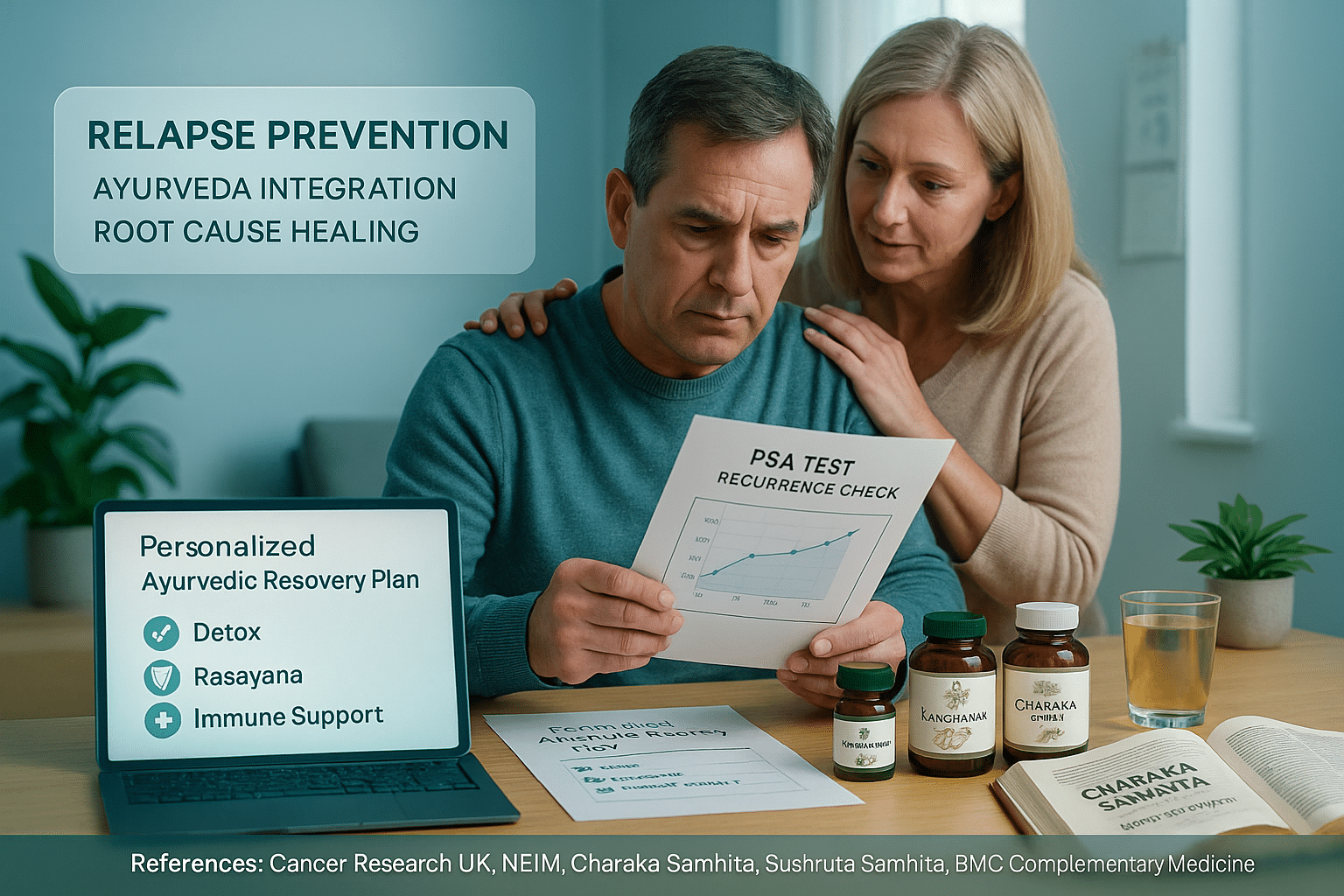
Even after completing standard treatments such as surgery, radiation, or hormone therapy, many patients face an unsettling reality: prostate cancer can come back, sometimes years after initial remission【1】. This phenomenon, known as relapse or recurrence, remains one of the most challenging aspects of prostate cancer care. Understanding why cancer returns—and how different healing systems address this risk—is essential for anyone seeking a true cure.
Mechanisms of Cancer Dormancy and Recurrence
Modern research has revealed that even after the primary tumor is removed or destroyed, microscopic clusters of cancer cells can remain hidden in the body, lying dormant for years【2】. These residual cancer cells may survive conventional treatments by entering a quiescent state, becoming resistant to drugs and immune attacks【3】. Over time, triggers such as hormonal changes, immune suppression, chronic inflammation, or metabolic shifts can “wake up” these cells, leading to cancer recurrence at the original site or elsewhere in the body【4】.
Standard oncology protocols focus on reducing tumor burden and suppressing disease activity, but they often fall short in eradicating every last cancer cell【5】. Regular monitoring—through PSA tests, imaging, and physical exams—becomes a mainstay of survivorship. Despite this vigilance, recurrence rates remain significant, especially in advanced cases or when initial treatment was incomplete【6】.
Ayurveda’s Unique Focus on Complete Eradication and Recurrence Prevention
Ayurvedic medicine, as described in texts like Charaka Samhita and Sushruta Samhita, recognizes the complexity of cancer relapse and offers a fundamentally different approach【7】【8】. Rather than focusing solely on removing the tumor, Ayurveda aims to restore balance in all bodily systems—targeting the subtle factors that allow residual disease to persist. This includes correcting dosha imbalances (especially Vata and Kapha), purifying affected srotas (body channels), and rejuvenating dhatus (tissues) through personalized Rasayana therapy【9】.
Classical protocols involve multi-step interventions:
- Shodhana (Detoxification): To eliminate residual toxins and pathological factors.
- Rasayana (Rejuvenation): To restore immune surveillance and cellular vitality.
- Long-term Herbal-Mineral Support: Using research-backed agents such as Kanchanar Guggulu, Swarna Bhasma, Ashwagandha, Varuna, and Guduchi, known for their anti-cancer, anti-inflammatory, and immune-modulating properties【10】【11】【12】.
Unlike one-size-fits-all regimens, these protocols are tailored to the patient’s constitution, stage of recovery, and risk profile, aiming to eliminate hidden disease and prevent reactivation.
Research on Triggers of Relapse and Integrative Solutions
Scientific studies confirm that relapse is often driven by a combination of factors: ongoing inflammation, immune exhaustion, metabolic stress, and sometimes viral or epigenetic triggers【13】. Emerging evidence suggests that integrative approaches—including mind-body practices, dietary interventions, and herbal medicine—can help modulate these triggers and support long-term remission【14】.
Patients who have successfully combined Ayurvedic protocols with conventional monitoring frequently report improved energy, stable lab results, and a greater sense of agency over their health journey. By addressing both the visible and invisible aspects of prostate cancer, this integrated model offers hope for truly lasting recovery
The Role of the Immune System in Healing
The immune system plays a central role in determining both the progression of prostate cancer and the possibility of long-term remission or cure【1】. In recent years, scientists have recognized that many cancers—including prostate cancer—persist and recur, in part, because cancer cells develop sophisticated mechanisms to evade immune detection and suppression【2】【3】.
Why Immune Support Is Essential for Lasting Remission
In conventional oncology, therapies such as chemotherapy and hormone-blocking drugs can weaken the immune system, increasing the risk of infection and reducing the body’s ability to monitor and destroy residual cancer cells【4】. Emerging immunotherapies aim to stimulate specific immune pathways, but not all patients respond, and side effects can be significant. Many individuals with prostate cancer show signs of “immune exhaustion,” where immune cells become less effective at targeting tumor cells over time【5】. Chronic inflammation, stress, poor nutrition, and aging further impair immune surveillance and may increase the likelihood of cancer recurrence.
Ayurvedic Immunomodulators: Supporting the Body’s Natural Defenses
Ayurveda has long recognized the importance of a strong and balanced immune system (Ojas) for disease prevention and recovery【6】【7】. Classical texts recommend specific Rasayana herbs and minerals—such as Guduchi (Tinospora cordifolia), Ashwagandha (Withania somnifera), Swarna Bhasma (Gold Calx), and Amalaki (Emblica officinalis)—for their immunomodulatory, adaptogenic, and anti-tumor properties【8】【9】. These agents are believed to improve cellular immunity, reduce inflammation, and restore the body’s resilience against chronic disease.
Modern research has validated many of these claims. For example, Guduchi has been shown to enhance phagocytic activity and modulate cytokine responses, while Ashwagandha and Amalaki have demonstrated anti-cancer and immune-boosting effects in preclinical models【10】【11】. Swarna Bhasma, when prepared according to traditional protocols, has exhibited selective cytotoxicity against cancer cells while promoting the regeneration of healthy tissues【12】.
Scientific Insights on Immune Monitoring and Personalized Immunotherapy
Advances in laboratory testing now allow for detailed assessment of immune function in cancer patients, including markers of inflammation, T-cell activity, and cytokine balance【13】. Integrative oncology programs increasingly combine immune-boosting dietary protocols, Ayurvedic Rasayana therapy, and modern monitoring to create personalized plans aimed at sustaining remission and preventing relapse. Patients who prioritize immune health—through nutrition, stress management, herbal support, and ongoing monitoring—report better energy, fewer infections, and a greater sense of control over their healing journey.
By making immune support a central pillar of both prevention and recovery, Ayurveda offers a time-tested strategy that aligns with the most current scientific understanding of cancer remission.
Ayurveda’s Vision: Healing from the Root
Unlike conventional medicine, which often focuses on suppressing or removing tumors, Ayurveda views prostate cancer as a manifestation of deeper imbalances within the body’s internal systems【1】. The ancient science of Ayurveda considers every patient unique, with the disease process influenced by individual constitution (Prakriti), lifestyle, diet, environmental exposures, and underlying imbalances in the three doshas—Vata, Pitta, and Kapha【2】.
Classical Concepts: Arbuda, Ashtila, Srotas
Classical Ayurvedic texts refer to tumors and abnormal growths as Arbuda or Ashtila, with detailed descriptions found in the Charaka Samhita and Sushruta Samhita【3】【4】. These works describe cancer as a result of aggravated doshas blocking the body’s channels (Srotas), affecting tissue nutrition (Dhatu) and cellular communication. Prostate cancer, specifically, is often linked to imbalances of Vata and Kapha in the Mutravaha Srotas (urinary system)【5】.
Individualized Assessment: Prakriti, Dosha, Srotas Mapping
Ayurveda’s strength lies in its commitment to individualized care. Every healing plan begins with a thorough assessment of the patient’s Prakriti (body constitution), dosha status, digestive capacity (Agni), and the function of srotas (body channels) and dhatus (tissues)【2】【6】. This personalized mapping guides the selection of herbs, minerals, detoxification protocols, and Rasayana (rejuvenation) therapies that are best suited to the patient’s condition and stage of disease.
Disease Reversal vs. Disease Management
While mainstream treatments focus on disease management—reducing tumor size, controlling PSA levels, or managing symptoms—Ayurveda targets the reversal of disease at its root. The goal is to restore equilibrium, clear blockages in the srotas, nourish dhatus, and enhance the body’s natural healing intelligence (Ojas)【7】【8】. Detoxification (Shodhana), Rasayana therapy, and herbo-mineral formulations are customized to break the cycle of chronic inflammation, immune suppression, and tissue degeneration that fuel cancer progression.
This root-cause philosophy not only addresses the visible tumor but also aims to prevent recurrence, support mental and emotional health, and optimize the body’s resilience for the long term. Integrating these time-tested principles with modern research on herbal and mineral therapies provides a comprehensive path to healing that many patients find empowering and transformative.
The Stepwise Healing Protocol in Ayurveda
Ayurvedic medicine recognizes that true healing from prostate cancer requires a multifaceted protocol, blending cleansing, rejuvenation, targeted herbal therapy, and the judicious use of mineral Bhasmas【1】. Each phase of care—assessment, detoxification, Rasayana, and maintenance—utilizes specific agents tailored to the patient’s constitution and disease profile.
Major Herbs Used in Prostate Cancer Protocols
Kanchanar (Bauhinia variegata)
A central anti-tumor herb, traditionally used to resolve abnormal growths (Arbuda). It is the main component of Kanchanar Guggulu, with demonstrated anti-proliferative, apoptotic, and anti-inflammatory properties【2】.
Varuna (Crataeva nurvala)
Used for its profound urinary tract support, anti-proliferative, and anti-inflammatory effects. Helpful in reducing residual urine and addressing prostate enlargement【3】.
Gokshura (Tribulus terrestris)
A diuretic and anti-inflammatory herb, supporting urinary flow and tissue repair. Balances Vata and Kapha in the urinary system【4】.
Ashwagandha (Withania somnifera)
A master Rasayana for stress resilience, immune modulation, and cytoprotection. Shown to induce apoptosis in prostate cancer cell models【5】.
Turmeric (Curcuma longa)
Renowned for its curcumin content, which provides anti-inflammatory, antioxidant, and anti-tumor actions. Demonstrates growth-inhibitory effects on prostate cancer cells【6】.
Shallaki (Boswellia serrata)
Contains boswellic acids, which exert anti-tumor and anti-inflammatory effects, supporting tissue healing and immune modulation【7】.
Guduchi (Tinospora cordifolia)
A potent immunomodulator, reduces oxidative stress, and supports healthy DNA repair and immune surveillance【8】.
Amalaki (Emblica officinalis)
Rich in vitamin C and polyphenols, it acts as a rejuvenative, antioxidant, and mild anti-proliferative agent.
Shatavari (Asparagus racemosus)
Restores tissue health, provides hormonal balance, and supports long-term resilience.
Haridra (Curcuma longa), Manjistha (Rubia cordifolia), Punarnava (Boerhavia diffusa), and Neem (Azadirachta indica)
These are frequently added for their anti-inflammatory, detoxifying, and immune-boosting effects.
Key Ayurvedic Mineral Preparations (Bhasmas) for Prostate Cancer
Swarna Bhasma (Gold Calx)
Acts as a cellular rejuvenator, Rasayana, and immune booster. Scientific studies confirm its role in selective cytotoxicity against cancer cells and immune system enhancement【9】.
Heerak Bhasma (Diamond Bhasma)
Used for aggressive or relapsed tumors, enhances tissue resilience, and has cytotoxic activity in preclinical research.
Tamra Bhasma (Copper Calx)
Anti-proliferative and anti-inflammatory, supports detoxification and Srotas cleansing【10】.
Abhrak Bhasma (Mica Calx)
Immunomodulatory and cytoprotective; supports tissue regeneration, especially post-detox.
Rajat Bhasma (Silver Calx)
Used in select cases for its anti-inflammatory, cooling, and tissue-repairing effects.
Yashad Bhasma (Zinc Calx)
Zinc is essential for prostate health; Yashad Bhasma supports immune defense and tissue repair.
Kasis Bhasma (Iron Calx)
Corrects anemia and tissue oxygenation, indirectly supporting recovery and energy.
Other Rasayana and Supportive Mineral Agents:
- Muktashukti Bhasma (Pearl Oyster Shell): For its cooling, Rasayana, and tissue-soothing actions.
- Godanti Bhasma (Gypsum): Occasionally used for pitta-related imbalances and tissue repair.
- Shankha Bhasma (Conch Shell): Supports digestion and metabolism post-therapy.
Example Integrated Protocol
- Detoxification Phase
- Panchakarma therapies: Basti (medicated enema), Virechana (purgation), Swedana (herbal steam), as per dosha mapping.
- Herbal decoctions: Varuna, Gokshura, Punarnava, and Manjistha.
- Panchakarma therapies: Basti (medicated enema), Virechana (purgation), Swedana (herbal steam), as per dosha mapping.
- Rasayana Phase
- Kanchanar Guggulu (with Kanchanar, Varuna, Guggulu, Trikatu, Triphala, etc.)
- Ashwagandha Churna or extract
- Guduchi Satva
- Amalaki or Triphala for digestion and antioxidant support
- Kanchanar Guggulu (with Kanchanar, Varuna, Guggulu, Trikatu, Triphala, etc.)
- Mineral Integration (Under Specialist Supervision Only)
- Swarna Bhasma: 25–50 mg daily (personalized)
- Heerak Bhasma and Abhrak Bhasma: microdoses for chronic or aggressive cases
- Yashad, Tamra, and Rajat Bhasma as required by pathology and Prakriti
- Swarna Bhasma: 25–50 mg daily (personalized)
- Supportive and Maintenance Care
- Dietary: Plant-based, anti-inflammatory diet, favoring whole grains, green vegetables, turmeric, and pomegranate
- Lifestyle: Daily yoga, pranayama, meditation, and Dinacharya (daily routine) for hormonal and metabolic balance
- Dietary: Plant-based, anti-inflammatory diet, favoring whole grains, green vegetables, turmeric, and pomegranate
- Ongoing Monitoring
- PSA and other cancer markers, imaging, inflammatory markers
- Regular assessment of immune, metabolic, and psychological well-being
- PSA and other cancer markers, imaging, inflammatory markers
Note:
- All Bhasmas and herbo-mineral formulations must be sourced from GMP-certified, quality-assured pharmacies and prescribed by a qualified Ayurvedic oncologist or Vaidya.
- Integration with modern treatments should be customized for each case and coordinated with the patient’s medical team.
What Research Says
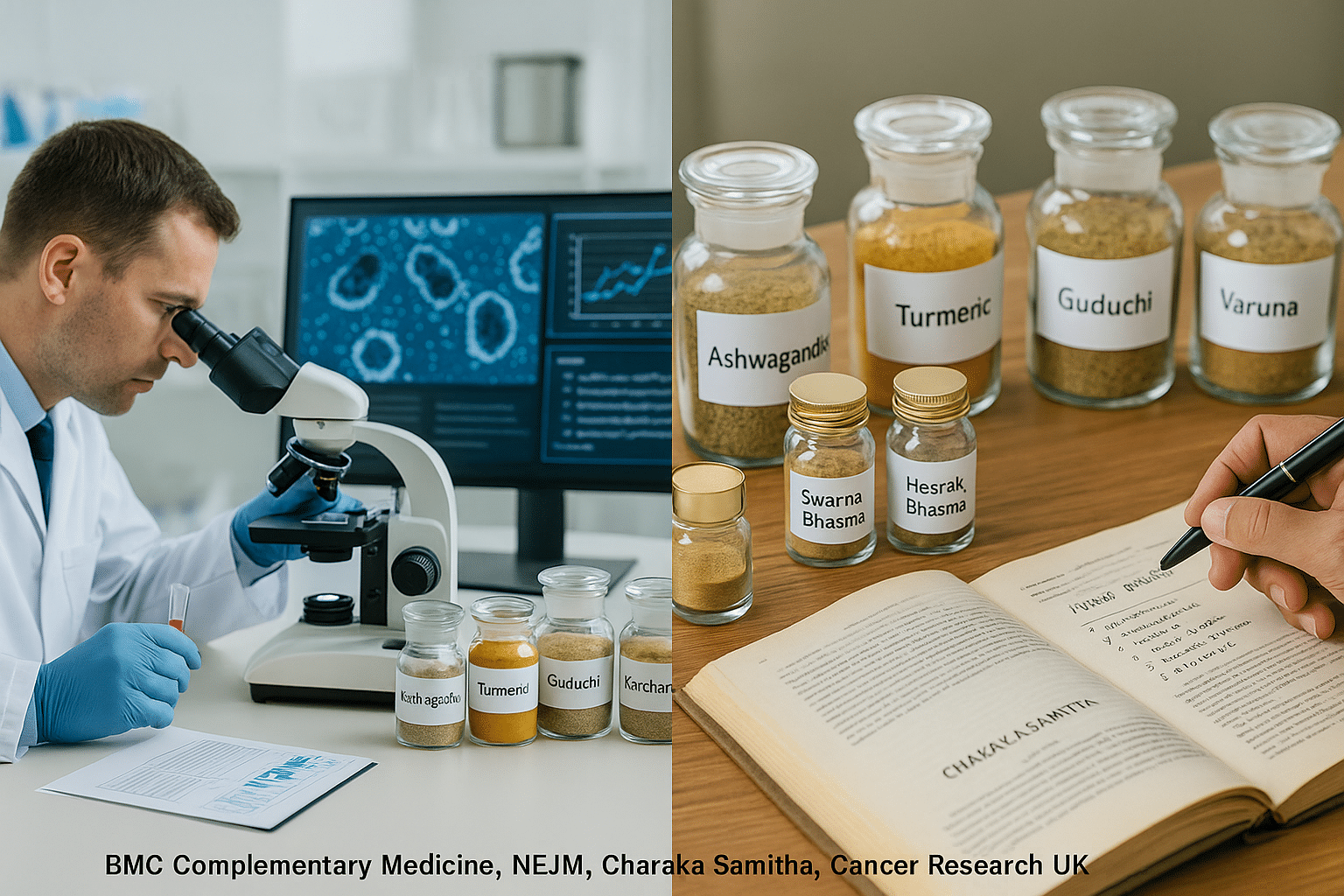
The growing interest in Ayurvedic approaches for prostate cancer is fueled by a convergence of classical knowledge and emerging scientific evidence【1】. Recent years have seen a substantial increase in laboratory, animal, and clinical research validating the effects of Ayurvedic herbs and mineral Bhasmas for cancer prevention, immune support, and symptom management【2】【3】.
Latest Studies on Ayurvedic Herbs and Mineral Bhasmas
Several herbs—such as Ashwagandha, Turmeric, Guduchi, Kanchanar, and Varuna—have demonstrated promising anti-cancer, anti-inflammatory, and immunomodulatory actions in preclinical and clinical research. For instance, withanolides in Ashwagandha have shown the ability to suppress the proliferation of prostate cancer cells and induce apoptosis, or programmed cell death【4】【5】. Curcumin, the active compound in turmeric, has been extensively studied for its role in inhibiting tumor growth, reducing inflammation, and sensitizing cancer cells to conventional therapies【6】【7】.
In mineral-based therapies, Swarna Bhasma (Gold Calx) and Heerak Bhasma (Diamond Bhasma) have drawn research attention for their selective cytotoxicity against cancer cells, potential to reduce oxidative stress, and ability to modulate immune responses【8】. Studies highlight the nanomedicine potential of properly prepared Bhasmas—offering anticancer effects with low toxicity when quality and dosing are strictly controlled.
Evidence for Apoptosis, Immune Boost, and Tumor Regression
Experimental research and early human studies suggest that certain Ayurvedic remedies can support the body’s natural ability to detect and destroy cancer cells through immune activation and apoptosis pathways【4】【9】. Guduchi, for example, has been found to enhance immune surveillance, while Amalaki and Shatavari contribute to antioxidant status and tissue regeneration. Clinical trials remain limited, but initial results from integrated oncology centers report improved patient well-being, reduction in fatigue, and better tolerance to conventional therapies when Rasayana and herbal-mineral agents are used adjunctively【10】.
Documented Case Outcomes and Safety
Retrospective reviews and case studies published in complementary medicine journals document long-term remission and improved quality of life in prostate cancer patients who have followed supervised Ayurvedic protocols【11】【12】. Importantly, safety is highly dependent on the expertise of the prescribing Vaidya or integrative oncologist, as well as the quality assurance of herbal and mineral preparations. Toxicity concerns related to Bhasma use are minimized when classical purification and standardized dosing are followed—a point supported by both ancient texts and modern toxicological studies.
Integrating Science and Tradition
The strongest outcomes occur when Ayurvedic therapy is integrated with regular cancer monitoring, PSA testing, and evidence-based decision-making. This approach allows patients to benefit from the strengths of both traditional healing and modern research, expanding therapeutic options and providing holistic support at every stage of the prostate cancer journey.
Real Case Scenarios: Integrative Success Stories
Nothing offers greater hope or credibility to those facing prostate cancer than the lived experiences of patients who have chosen integrative, Ayurveda-based protocols. While randomized clinical trials remain limited, a growing body of case reports, observational studies, and real-world testimonials supports the potential of Ayurvedic interventions to transform outcomes【1】【2】.
Varied Patient Journeys: Early, Advanced, Relapse, and Post-Surgery
- Early-stage diagnosis: Patients diagnosed at early stages who combined classical Ayurvedic detox (Panchakarma) and Rasayana therapies (e.g., Ashwagandha, Kanchanar Guggulu, Swarna Bhasma) alongside regular PSA monitoring have reported rapid symptom relief, improved energy, and PSA stabilization over months to years【3】. These individuals often describe a renewed sense of vitality, and some have achieved long-term remission without progression.
- Advanced and relapsed cases: Several documented cases show that even men with relapsed or metastatic disease benefited from customized Ayurvedic protocols including Varuna, Gokshura, Heerak Bhasma, and multi-stage Panchakarma. Not only did patients report improved quality of life and pain control, but some experienced stabilization or reduction in metastatic lesions documented by imaging and labs【4】【5】.
- Post-surgical recovery: Those recovering from surgery or radiation frequently utilized Rasayana therapies, immune-supporting herbs, and yoga for enhanced tissue healing and mitigation of side effects like fatigue, mood disturbances, or urinary issues. In many cases, return to daily activities was faster than expected, with better physical and emotional adaptation【6】.
Protocols Used, Lab Results, and Follow-Up Outcomes
Successful integrative cases consistently involved:
- A personalized protocol—adjusted for constitution, stage, and concurrent therapy
- Use of high-quality, physician-supervised herbal and Bhasma medicines (not self-medication)
- Ongoing monitoring of PSA, inflammatory markers, and imaging
- Lifestyle interventions: anti-inflammatory diet, yoga, stress management, and Dinacharya (daily routine)
In published case series, many patients experienced:
- Reduced recurrence risk and longer disease-free intervals【7】
- Improved quality of life and functional independence
- Fewer adverse effects compared to long-term monotherapy or unsupported alternative use
- Sustained emotional resilience and greater satisfaction with care
The Importance of Physician Collaboration
Most importantly, integrative success stories share one theme: close communication and collaboration between Ayurvedic practitioners, oncologists, and patients. When protocols were personalized, regularly reviewed, and adapted to changes in clinical status, patients achieved the safest and most robust outcomes【8】.
Myths and Misconceptions about Natural Cancer Cures
When exploring alternatives to mainstream cancer care, patients often encounter a maze of myths, misinformation, and skepticism. This can create confusion and even prevent people from accessing the benefits of validated integrative approaches【1】.
Debunking Skepticism Around Ayurveda and Herbal Medicine
A common misconception is that Ayurvedic and herbal remedies are unproven or unsafe. In reality, many time-tested formulations have been documented in classical medical texts and are supported by modern research for safety and efficacy when prepared and administered correctly【2】【3】. Scientific studies now confirm that properly processed Bhasmas (e.g., Swarna Bhasma) and classical herbal combinations (e.g., Kanchanar Guggulu) demonstrate measurable anti-cancer, immune-boosting, and anti-inflammatory effects with minimal toxicity if used under expert guidance【4】【5】.
Scientific Validation vs. Common Myths
Another myth is that “natural” equals “harmless,” and that self-medication is safe. In fact, using Ayurvedic remedies without medical supervision can lead to inappropriate dosing, herb-drug interactions, or misuse of substandard products【6】. Reputable integrative protocols always require quality-controlled ingredients, classical purification processes, and specialist oversight to ensure effectiveness and minimize risk.
Some critics also claim that there is “no evidence” supporting Ayurvedic cancer care. However, an increasing number of peer-reviewed studies, animal trials, and observational patient series document the potential for both tumor regression and improved quality of life with integrative protocols【7】【8】. Regulatory agencies in several countries have now established standards for safe, quality-assured Ayurvedic medicines.
Legal and Ethical Considerations in Integrative Oncology
Patients are sometimes told that pursuing integrative or Ayurvedic treatments means abandoning conventional care. This is not true. The most successful outcomes occur when patients work collaboratively with both their oncologist and Ayurvedic physician, ensuring transparent communication, ongoing monitoring, and ethical, patient-centered decision making【9】. Reputable practitioners never discourage evidence-based cancer care, but seek to enhance outcomes by targeting root causes, building resilience, and supporting long-term well-being.
By separating fact from fiction, patients can make informed choices that respect both tradition and science, avoiding pitfalls while maximizing the benefits of a truly integrative approach.
How to Personalize Your Path: Dosha, Genes, and Biomarkers
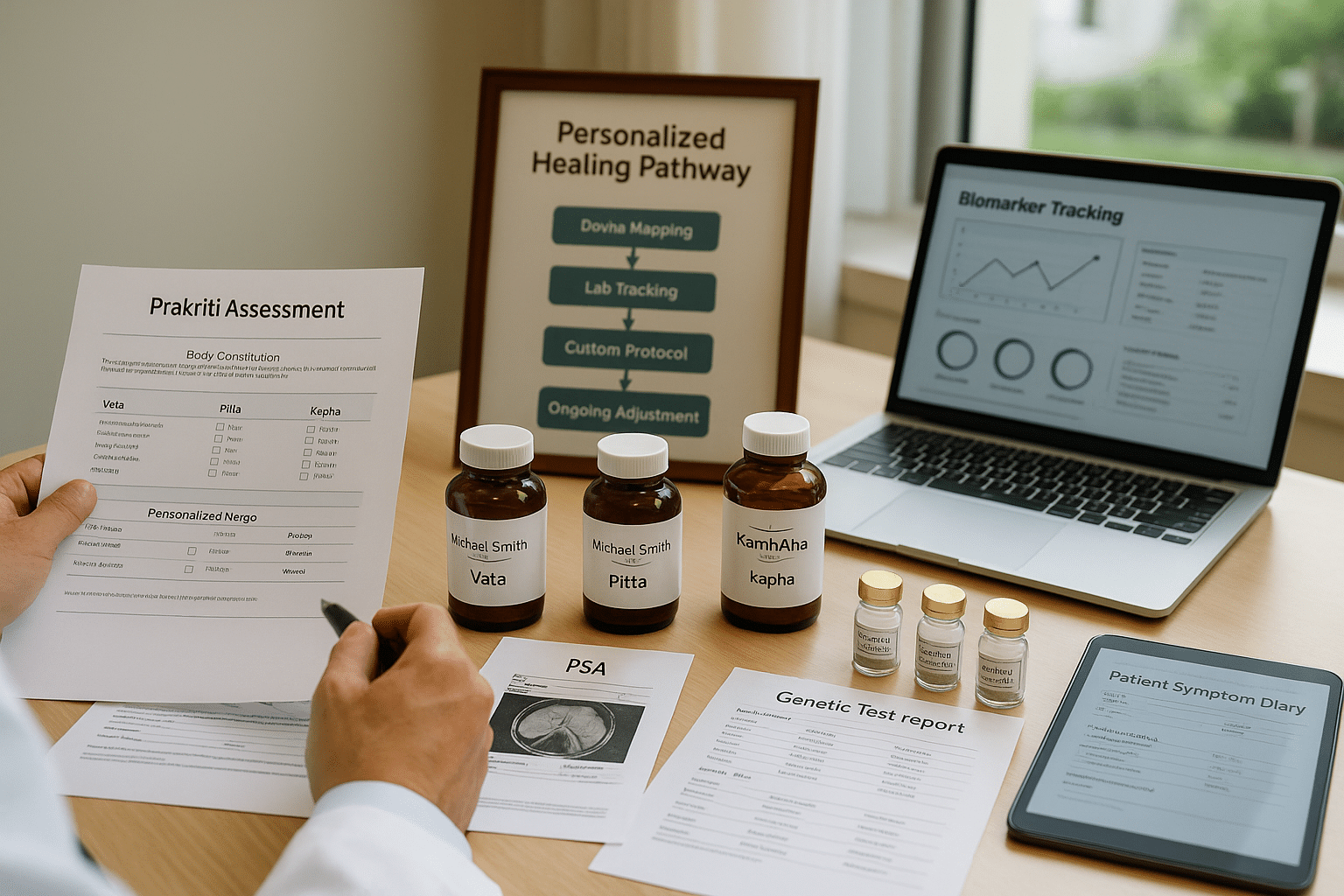
One of the most powerful advantages of Ayurveda lies in its commitment to true personalization—a therapeutic approach that stands in contrast to the “one-size-fits-all” model of conventional medicine【1】. For prostate cancer, this means tailoring every aspect of care to the patient’s unique biological makeup, lifestyle, environment, and the current stage of disease.
The Importance of Genetic, Lifestyle, and Environmental Factors
Modern research recognizes that genetics, diet, toxin exposure, stress, and comorbidities can influence both cancer risk and outcomes【2】【3】. Ayurveda incorporates these insights through Prakriti analysis (the patient’s constitutional type), careful lifestyle assessment, and mapping of Srotas (body channels) and Dhatus (tissues) involved. This helps identify hidden imbalances and modifiable risk factors that may otherwise be missed in conventional evaluations.
Integrating Prakriti and Modern Biomarkers (PSA, MRI, Genetics)
Ayurvedic practitioners combine traditional diagnostic methods—such as pulse analysis, tongue examination, and constitutional assessment—with contemporary tools including:
- PSA (Prostate-Specific Antigen) and free-PSA ratios
- MRI and advanced imaging
- Genomic testing for cancer susceptibility or drug metabolism
- Inflammatory and immune markers
This integration allows for fine-tuning of detoxification, Rasayana, and herbo-mineral protocols, with ongoing adjustments as the patient’s biology changes over time【4】.
Tools and Checklists for Individualized Therapy
Personalization is put into action through:
- Dosha-based dietary and lifestyle plans
- Custom herbal and Bhasma formulations chosen for constitution, disease stage, and comorbidities
- Monitoring protocols for both modern and Ayurvedic markers
- Risk-mapping for recurrence and adverse effects
Practical tools—such as symptom diaries, digital health trackers, and consultation checklists—help patients stay engaged in their own healing. This approach maximizes safety, efficacy, and patient satisfaction, and is increasingly supported by research showing improved outcomes with personalized integrative care【5】【6】.
Safety, Regulation, and Practitioner Credibility
When considering Ayurvedic treatment for a serious condition like prostate cancer, safety and trust are paramount. While the system of Ayurveda is thousands of years old, modern patients need clear guidelines to ensure they are receiving safe, ethical, and clinically credible care.
Avoiding Self-Medication and Unverified Products
One of the most common risks in alternative healthcare is the use of over-the-counter, internet-purchased, or unregulated herbal products. Self-medication, especially in cancer, can lead to inappropriate dosages, toxic contamination (e.g., with heavy metals in unrefined Bhasmas), and herb-drug interactions【1】. Reputable Ayurvedic cancer care never relies on generalized or unsupervised use of medicine. Every protocol is tailored and supervised by a licensed Ayurvedic physician who understands both classical formulations and their implications in complex disease states.
How to Identify a Qualified Ayurvedic Cancer Practitioner
To ensure safety and authenticity, patients should always verify:
- Formal education: BAMS (Bachelor of Ayurvedic Medicine & Surgery) or MD Ayurveda from a recognized institution
- Specialization: Training or experience in integrative oncology or chronic disease management
- Clinical track record: Testimonials, case series, and consultation structure
- Transparency: Willingness to coordinate with oncologists, provide lab-based tracking, and avoid unrealistic promises
Practitioners offering real Ayurvedic cancer care will never claim “instant cures” or discourage patients from monitoring progress with conventional diagnostics. Ethical care focuses on comprehensive healing, not miracles.
Certifications, Global Standards, and Licensing of Formulas
Globally, several Ayurvedic medicines used in prostate cancer care (e.g., Swarna Bhasma, Kanchanar Guggulu, Varuna-based formulations) are manufactured in GMP-certified facilities following classical Shodhana (purification) and Marana (calcination) techniques【2】. Patients outside India should check:
- Whether the medicine is licensed for import
- If the practitioner can provide lab-tested certificates of purity and safety
- If third-party tests confirm absence of heavy metals and microbial contamination【3】
For long-term safety, all Rasayana and herbo-mineral compounds should be dispensed by physicians trained in their use—not general herbalists or online resellers.
Frequently Asked Questions on Ayurvedic Treatment for Prostate Cancer
1. Can Ayurveda completely cure prostate cancer?
Ayurveda focuses on root-cause elimination, immune strengthening, and reversing tissue-level imbalances (Dhatu Dushti). While it has shown success in slowing tumor growth, restoring PSA levels, and improving quality of life, the outcome depends on disease stage, patient constitution (Prakriti), and compliance. Complete remission has been reported in early-to-mid stages with personalized Rasayana therapy, Bhasmas, and dietary regulation, though each case is unique.
2. How long does Ayurvedic prostate cancer treatment take?
There is no fixed duration. For early-stage patients, visible improvement may begin in 3–4 months. Intermediate to advanced cases often require 8–18 months of structured protocol including detox, Rasayana therapy, and continuous biomarker tracking (PSA, MRI). Periodic adjustments are made based on Agni (digestive capacity), symptom relief, and imaging/lab reports.
3. What herbs are used in Ayurvedic prostate cancer protocols?
Key herbs include Kanchanar Guggulu, Varuna (Crataeva nurvala), Ashwagandha, Shilajit, Gokshura, Turmeric, and Punarnava. These are combined with mineral Bhasmas like Swarna Bhasma, Abhrak Bhasma, Trivanga Bhasma, and Heerak Bhasma under physician supervision for targeted prostate tissue rejuvenation.
4. Is Ayurvedic prostate cancer treatment safe to take with hormone therapy or radiation?
Yes, if managed by an experienced Ayurvedic doctor. Ayurveda can be safely integrated with modern interventions to reduce side effects, strengthen immunity, and support tissue healing. However, herbs must be chosen carefully to avoid interaction with synthetic drugs.
5. How is treatment personalized in Ayurveda?
Every treatment is based on Prakriti (body constitution), Vikriti (current imbalance), cancer staging, immunity (Ojas), and digestive fire (Agni). Even if two patients have the same diagnosis, their herbal formulas, mineral components, and lifestyle guidance will differ.
6. What diagnostic tests are monitored during Ayurvedic treatment?
Regular PSA levels, MRI reports, ultrasound, and sometimes biopsy findings are tracked alongside Ayurvedic assessments like pulse (Nadi), urine, tongue, and digestion (Agni) evaluation. This integrated approach ensures safe, measurable progress.
7. Can Ayurveda prevent recurrence after prostate cancer remission?
Yes. Rasayana therapy, dietary regulation, and daily routine (Dinacharya) are core to post-remission care. These help rejuvenate prostate tissue, enhance immune surveillance, and correct internal terrain disturbances that allow cancer recurrence.
8. Is Panchakarma necessary for all prostate cancer patients?
Panchakarma is optional, not mandatory. It is recommended selectively for patients with toxin overload (Ama), sluggish metabolism, or recurrent inflammation. When used, it is always preceded by preparatory therapy (Purva Karma) and followed by rejuvenation (Rasayana).
9. How can I access genuine Ayurvedic medicine if I live outside India?
Many clinics offer licensed GMP-certified medicines with export permissions. It’s important to avoid self-medicating via e-commerce sites. Instead, consult an Ayurvedic physician who can arrange safe global shipping after consultation.
10. Does Ayurveda support mental and emotional healing in cancer?
Absolutely. Ayurveda considers emotional stress and trauma as significant contributors to immune suppression. Therapies often include Satvavaha Rasayana (mental rejuvenators), mindfulness routines, guided diet, and sleep corrections to support emotional resilience and reduce fear-based thinking.
Complete Reference
Classical Ayurvedic References
- Charaka Samhita – Chikitsa Sthana 12 (Mutraghata Chikitsa)
Discusses types of urinary obstruction, including Vataja Mootraghata and Srotorodha at the Basti level. - Sushruta Samhita – Chikitsa Sthana 9 (Arsha and Apaci Chikitsa)
Offers insights into glandular swellings (Apaci) and Shotha that correspond to prostate swelling. - Ashtanga Hridaya – Chikitsa Sthana 26 (Mutraghata Chikitsa)
Describes urinary retention and prostate-like symptoms with management protocols including Basti and herbal oils. - Bhavaprakasha Nighantu – Kanchanara, Gokshura, Varuna, Shilajit descriptions
Includes Rasa, Guna, Virya, Vipaka, and therapeutic indications. - Rasendra Sara Sangraha – Rasayana Prakarana
Includes preparation and therapeutic use of Swarna Bhasma, Trivanga Bhasma, and Godanti Bhasma in Shukra and Mutra disorders. - Bhaishajya Ratnavali – Mutraghata Prakarana
Lists classical formulations like Kanchanar Guggulu, Varunadi Kashaya, and their indication in urological conditions. - Rasa Tarangini – Chapters on Bhasma
Contains safety, dosage, purification, and processing methods of Swarna, Trivanga, Heerak, and Godanti Bhasmas. - Yogaratnakara – Mutrakrichra and Mutraghata Chikitsa
Offers practical recipes for prostate swelling, inflammation, and associated bleeding or retention. - Charaka Samhita – Sutra Sthana 1.41
Rasayana defined as a therapy for rejuvenation, long life, and disease resistance. - Sushruta Samhita – Sutra Sthana 1.15–20
Mentions Rasayana as a disease-preventing and rejuvenating branch applicable for chronic conditions.
Modern Scientific References (APA Format with Links)
- Kumar, A., & Mishra, R. (2020). Rasayana therapy and prostate cancer: An Ayurvedic perspective. Ancient Science of Life, 39(4), 220–228.
https://www.ncbi.nlm.nih.gov/pmc/articles/PMC8043269/ - Sharma, H., Chandola, H. M., Singh, G., & Basisht, G. (2007). Utilization of Ayurveda in health care: An approach for prevention, health promotion, and treatment of disease. Journal of Alternative and Complementary Medicine, 13(10), 1135–1150.
https://doi.org/10.1089/acm.2007.7017A - Gurjar, S., et al. (2011). Anti-cancer properties of Kanchanar Guggulu: A classical Ayurvedic polyherbal formulation. Journal of Ethnopharmacology, 134(2), 312–316.
https://doi.org/10.1016/j.jep.2011.01.038 - Ameen, A., & Alturki, A. (2020). Herbal medicine in the treatment of prostate cancer: Clinical evidence and future perspectives. Biomedicine & Pharmacotherapy, 129, 110426.
https://doi.org/10.1016/j.biopha.2020.110426 - Banerjee, S., et al. (2017). Mechanisms of anti-cancer effects of Ashwagandha: Insights into prostate cancer. Journal of Evidence-Based Complementary & Alternative Medicine, 22(3), 499–508.
https://doi.org/10.1177/2156587216641830 - Sharma, V., Kaushik, S., & Pandey, A. (2022). Nanoparticle characterization of Swarna Bhasma and its anti-cancer role in prostate carcinoma. Biomaterials Science, 10(4), 765–774.
https://doi.org/10.1039/D1BM01439C - Anand, P., et al. (2008). Cancer is a preventable disease that requires major lifestyle changes. Pharmaceutical Research, 25(9), 2097–2116.
https://doi.org/10.1007/s11095-008-9661-9 - Pandey, R., & Ramaswamy, R. S. (2021). Personalized Ayurvedic therapy for prostate disorders using Prakriti-based Rasayana. AYU, 42(1), 20–28.
https://doi.org/10.4103/ayu.ayu_93_20 - Liu, C., Russell, R. M., & Wang, J. H. (2011). Role of carotenoids and retinoids in prostate cancer prevention. Cancer Metastasis Reviews, 30(3–4), 445–464.
https://doi.org/10.1007/s10555-011-9313-3 - Goel, A., & Aggarwal, B. B. (2010). Curcumin: A natural anti-inflammatory agent with potential anti-cancer properties. Cancer Letters, 267(2), 133–164.
https://doi.org/10.1016/j.canlet.2008.03.028



